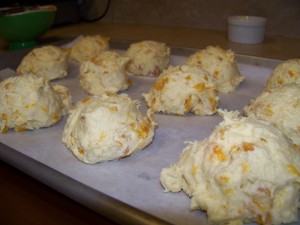I recently made a batch of my apricot scones. I have adjusted the recipe for my taste, so I use almond extract instead of vanilla. I often make a double batch, too. I plate the dough onto a parchment lined jelly rollpan with a large ice cream scooper and freeze them, uncooked.

The last batch I made I forgot the almond extract. The scones were still good, but I could tell they lack something. They rise, they brown, they are soft and airy…but the loss of that single teaspoon alters the edible experience drastically. There have been other times, while cooking, that I am missing an ingredient. The item may not be essential for the recipe to be a success; often, the absence goes unnoticed by others sharing the meal….I but I know it is different. Is it that I know I left it out, that my pantry was deficient or that the final product is off just fractionally and I can tell? Am I that discerning?
I know what I have in reserve. I know my abilities. I also know what is on ration. My mother recalls a time during WWII, when her mother bought groceries with rations stamps: essential ingredients like sugar, flour and fresh fruit. Rationing brought the butter substitute of margarine. We all know the fall out 50 years later of a generation raised on transfats. We considered margarine an equivalent substitute for butter. It seemed to give us what we needed. Only a half century later to we realize that in our attempt to maintain a semblance of normalcy, we ingested decades of fake food made with a chemical that causes heart disease (and God knows what else). Was the fake food worth it? We all got to spread cheap margarine on our toast, but it was a poor substitute…even a dangerous one.
We fake so much to maintain appearances. There is an oft spoken adage of recovery: “Fake it until you make it.” How things look, how we are perceived accounts for much of how we live and work. How long does it take for the faking to feel real; when does the pretense become reality? When do we lose our recall of how things once were or might have been and proclaim the falsehood as truth?
I think there is some terrible beauty in the brain or heart post ischemia. The cataclysm of deprivation cause the vitality to be starved. It withers, it atrophies; it may even die, leaving a bright white nit of scar tissue in the brain, easy to see with gadolinium. The heart wall sits motionless on the thallium. The river run off is obstructed and drought ensues; the damage is easy to pinpoint. For the stroke victim, they can lose the ability to speak or swallow or walk. Sometimes the damage is subtle, the loss is in single vocabulary words or subjects. They forget the word for button or refrigerator or jumping. This is the elegance of the human mind. The brain seeks a work around. It finds a substitution, like using vanilla when you do not have almond extract. The child is hopping rope rather than jumping rope. It is not exactly the same, we hear the stumble and pause for a nanosecond, but we accept the substitution.
In the realm of intimacy, much is similar. When we are damaged by love, does our heart seek a path to work around the dead area?Is there a reasonable substitution for this ingredient or is love one of those essential ingredients? Is there a love substitute? A margarine equivalent? If there is such an option, after how many years should we expect the consequences of the fake and disingenuous?
We can end up with the psychological equivalent of a Widow Maker, that obstruction that costs one’s life. Avoiding the Widow Maker requires drastic measures: changes in every aspect of how you live. If you want to live, you must CHANGE. Don’t change and at any moment, you can drop dead.
Love is also like war, the ultimate battlefield. And in war times, there was usually rationing. We accept less. We make due. We work for the greater good. There is an objective and a desired outcome. The enemy is known and all energy is focused on its defeat. The entire effort has to be geared to working towards that end-game. In war, loss is considered necessary at times. Do we surrender from the first moment? Do we lie down our arms, lay ourselves bare, risk all in offering? It is what a multitude of faiths and poets suggest. But, the surrender to love is only truly safe and balanced is mutual. A conditional surrender leaves disparity and an imbalance of power. It may be better to acknowledge that a flank will be cut off from the rest and lost, if it means the rest of us get home safely.
And those lost parts cannot be returned. Unlike the magical, regenerative starfish, when we lose an essential component of our hearts to the battlefield of love, it may indeed be lost forever in the destruction. But is that loss a fundamental ingredient to our existence? Can we live without the depth of love and trust we once carried into this world? One can ration and sustain a life. One can live, even thrive without a full larder. As long as one does not remember the “old days” when there was fresh butter and giant oranges and fresh bread baked each day. We must accept Hot Pockets and McDonald’s and Coca Cola and believe that is REAL FOOD.

Is “Love” an essential ingredient? Yes, I think that it is.
Is there a substitute? No.
But love is not like flour where it’s all the same. Love is unique and has such a wide and varied pallet. “Love” is a choice, and is an active one. Is the way in which I love a friend less than that of a lover or a spouse? Is the way in which I love my current lover automatically less or more than how I loved my last lover?
I imagine love like a bottle of wine or a small batch scotch. Each batch, each bottle is totally and completely unique even though they come from the same source. So it is that we give our love bottled to those we love, each unique though they come from the same source.